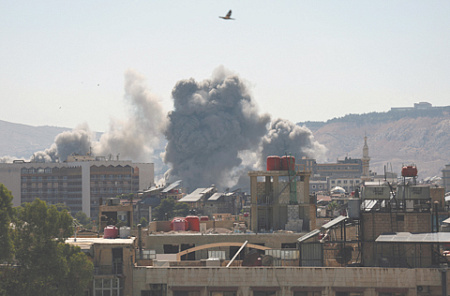
The Israel Defense Forces (IDF) have reportedly disregarded a request from the U.S. administration to halt military action in Syria, instead escalating a bombing campaign that has now reached the capital, Damascus. The strikes, which began in response to deadly clashes between Druze and Bedouin communities in southern Syria, have targeted the Syrian Army’s General Staff headquarters and the area surrounding the presidential palace, representing a significant new phase in Israeli military activity in the region.
The intervention was triggered by violent confrontations in Syria’s southern Suwayda province. Israel has stated its operations aim to protect the local Druze minority, a unique ethnoreligious group with a significant population in both Syria and Israel. The IDF has publicly confirmed strikes on Syrian military routes, armored vehicles, rocket launchers, and weapons depots, declaring it is prepared for “various scenarios” as the regional crisis deepens.
This military escalation coincides with an unprecedented security challenge on Israel’s northern border. Hundreds of Israeli Druze citizens, galvanized by reports of the violence, have attempted to cross into Syria to aid their ethnic kin. The border breaches began even before the community’s spiritual leader, Sheikh Mufaq Tarif, urged his followers to prepare to cross and help their “slaughtered brothers,” accusing Israeli authorities of inaction as the death toll reportedly surpassed 200.
In an urgent televised address, Prime Minister Benjamin Netanyahu appealed directly to Israel’s Druze citizens. “The situation in southwest Syria is very serious,” he said. “The IDF is working, the air force is working… I have one request of you: you are citizens of Israel. Do not cross the border.” Netanyahu warned that those attempting to enter Syria could be kidnapped or killed, and that their actions were hampering the military’s efforts.
Top Israeli officials have adopted a resolute stance. Defense Minister Israel Katz vowed to protect the Syrian Druze and warned Damascus to prepare for “maximally painful strikes,” stating the time for quiet warnings was over. The crisis has also amplified calls within the Israeli government for a more aggressive policy toward Syria, with some officials demanding the removal of its transitional president, Ahmed al-Sharaa.
For its part, the transitional government in Damascus has been forced to respond to allegations that its own security forces were involved in atrocities against civilians. President al-Sharaa’s office issued a statement condemning the violence in Suwayda as “unlawful and criminal” and promised a full investigation to hold all perpetrators accountable and protect the rights of its citizens.
Analysts warn that the sectarian nature of the violence could have devastating long-term effects. A report from the Institute for the Study of War (ISW) concluded that the abuses “will be perceived by Syria’s minorities as sectarian in nature and have long-term repercussions,” likely undermining trust between communities and the fragile transitional government.
